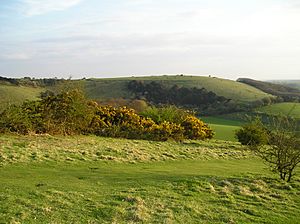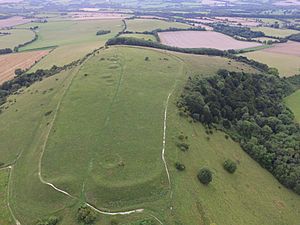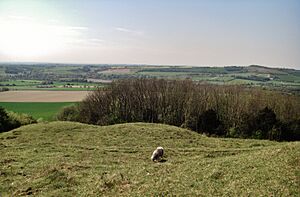Old Winchester Hill facts for kids
| Site of Special Scientific Interest | |
 |
|
| Area of Search | Hampshire |
|---|---|
| Interest | Biological |
| Area | 66.2 hectares (164 acres) |
| Notification | 1986 |
| Location map | Magic Map |
Old Winchester Hill is a special place in Hampshire, England. It covers about 66 hectares (that's like 163 football fields!). This area is protected because it's a "Site of Special Scientific Interest" and a "National Nature Reserve." This means it's super important for its amazing wildlife and plants. Part of the hill is also a "Scheduled Monument," which protects old historical sites.
Contents
Where is Old Winchester Hill?
Old Winchester Hill is in Hampshire, England. It's about 18 kilometers (11 miles) from the city of Winchester. The hill is on the eastern side of the Meon Valley, near a village called Corhampton.
You can find the South Downs Way and Monarch's Way walking paths crossing the top of the hill. The highest point of the hill is 197 meters (646 feet) above sea level. In 2009, Old Winchester Hill became part of the beautiful South Downs National Park.
History and Archaeology
The top of Old Winchester Hill holds an ancient secret: an Iron Age hill fort! This fort was like a big, walled village built a very long time ago. Inside the fort, you can also see older burial mounds called Bronze Age barrows.
Ancient Structures
The barrows are even older than the fort. They were built between 4500 and 3500 BCE. The hill fort itself was likely built during the Early or early-Middle Iron Age, around 600 to 300 BCE. Most hill forts in southeast England were no longer used by about 150 to 100 BCE.
World War II History
More recently, during World War II, the British Army used the hill for testing mortars. These were weapons that fired bombs. Some parts of the hill were fenced off because there might still be old, unexploded items. However, sheep graze freely, and the risk to visitors is very low.
Amazing Wildlife
Old Winchester Hill is a "Site of Special Scientific Interest" and a "National Nature Reserve." This means it's a very important place for nature. It has a special type of grassland called "chalk downland." This kind of land is perfect for many different plants and animals.
Butterflies and Birds
The hill is a fantastic spot for butterflies! You might see colorful ones like the Adonis blue, chalkhill blue, common blue, and marbled white. Other butterflies include the dark green fritillary, Essex skipper, meadow brown, silver-spotted skipper, small heath, small skipper, and speckled wood.
Many birds also live here. You might spot a European green woodpecker looking for food among the many anthills. These anthills are also very important for the life cycle of some butterflies. You might even hear the gentle cooing of a turtle dove.
Beautiful Orchids
Old Winchester Hill is also home to many types of beautiful orchid flowers. Keep an eye out for the fly, bee, and frog orchids growing on the hill.
Images for kids
 | Frances Mary Albrier |
 | Whitney Young |
 | Muhammad Ali |




